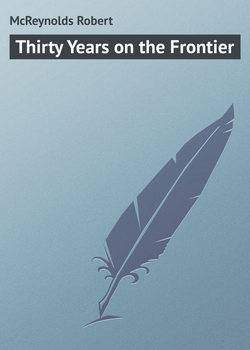Thirty Years on the Frontier

Реклама. ООО «ЛитРес», ИНН: 7719571260.
Оглавление
McReynolds Robert. Thirty Years on the Frontier
I. IN DAYS OF INNOCENCE
II. OUT FOR A FORTUNE
III. BLACK HILLS DAYS
IV. THE CUSTER MASSACRE
V. THE SHADOW SCOUT
VI. INDIAN FIGHT IN COLORADO
VII. A COWBOY DUEL
VIII. PLEASANT HALFACRE’S REVENGE
IX. CAPTURING WILD HORSES
X. AN EXPEDITION THAT FAILED
XI. ACROSS THE PALM DESERT
XII. THE LAST STAND OF A DYING RACE
XIII. THE TRAGEDY OF THE LOST MINE
XIV. THE LAND OF THE FAIR GOD
XV. OUTLAWRY IN OKLAHOMA
XVI. A NEW LAND OF CANAAN
XVII. TOLD AROUND THE CAMPFIRE
XVIII. THE LONE GRAVE ON THE MESA
XIX. UNDER THE BLACK FLAG
XX. IN CUBAN JUNGLES
XXI. EMULOUS OF WASHINGTON
XXII. ON THE ROUND UP
XXIII. THE EGYPT OF AMERICA
XXIV. IN THE DOME OF THE SKY
XXV. WHERE NATURE IS AT HER BEST
XXVI. WHEN THE WEST WAS NEW
Отрывок из книги
My first view of the Nebraska plains was the next morning after leaving Omaha, and I thought I never saw anything half so grand. The February sun threw its beams aslant the mighty sea of plain over which so many white covered wagons had toiled on their way to the then wild regions of the West.
Small herds of buffalo and antelope were frequently seen from the car windows; the passengers fired at them and often wounded an antelope, which limped away in a vain attempt to join its mates. That night we witnessed the mighty spectacle of the plains on fire. The huge, billowy waves of flame leaped high against a darkened sky, and swept with hiss and roar along the banks of the shallow Platte. The emigrant train upon which I was aboard was crowded with people of all sorts. Many of them were homeseekers on their way to Oregon and California, while not a few adventurers like myself were bound for the Black Hills. A young man who went under the name of Soapy Wyatte, was working the train on a three-card monte game, and was very successful until he cheated a couple of ranchmen out of quite a sum of money. Then they organized the other losers, and were in the act of hanging him with the bell rope when he disgorged his ill-gotten gains and paid back the money. Men of his class were plentiful, but as a rule they were careful not to cheat the frontiersman, for when they did they usually got the worst of it.
.....
They had passed cautiously through a dense grove of trees and the head of the column entered upon a beautiful level meadow about a mile in width extending along the west side of the stream and skirted east and west by high bluffs. It was apparent at sight that this meadow had been the site of an immense Indian village and showed signs of hasty abandonment. Hundreds of lodge poles with finely dressed buffalo robes, dried meats, utensils and Indian trinkets were left behind. In a large tepee still standing were the stiffened forms of ten dead Indians. Every step of the march from here on showed signs of a desperate struggle. The dead bodies of Indian horses were seen; here and there were cavalry equipments, and soon the bodies of dead troopers, beside their frantic and still struggling, wounded horses gave evidence of a disastrous battle, and farther on was revealed a scene calculated to appall the stoutest heart. Here was a skirmish line marked by rows of slain with heaps of empty cartridge shells before them, and their officers lay dead just behind them. Still farther on men lay in winrows, their faces still drawn with the awful desperation of a struggle unto death; pulseless hands still clasped blood-stained sabres. Near the highest point of the hill lay the body of General Custer. There was a cordon of his brave defenders dead about him; his long hair was clotted with blood, while a great wound in his breast told how the brave soul had gone somewhere out into the wide waste and hush of eternity. Near him lay the body of his brother, Captain Custer, and some distance away another brother, Boston Custer, and his nephew, Armstrong Reed, a youth of 19. All were scalped except General Custer and Mark Kellogg, a correspondent of the New York Herald.
When the fight was at the hardest a Crow Indian with Custer wrapped himself in a dead Sioux Indian’s blanket and made his escape; as he left the field he saw the squaws and Indian children rifling the dead of their trinkets and going about with their stone battle axes beating out the brains of the wounded; they danced about over the dead and dying, mutilating their bodies and singing the wild, weird strains of their battle songs.
.....